高中英语动词时态复习课件 (共55张)
文档属性
| 名称 | 高中英语动词时态复习课件 (共55张) | 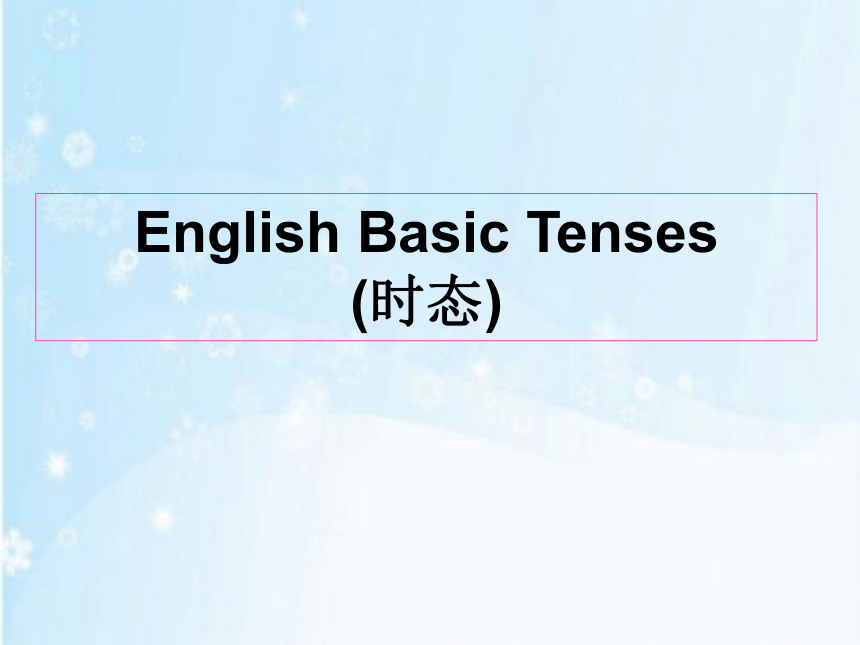 | |
| 格式 | zip | ||
| 文件大小 | 464.1KB | ||
| 资源类型 | 教案 | ||
| 版本资源 | 通用版 | ||
| 科目 | 英语 | ||
| 更新时间 | 2019-05-30 06:56:40 | ||
图片预览

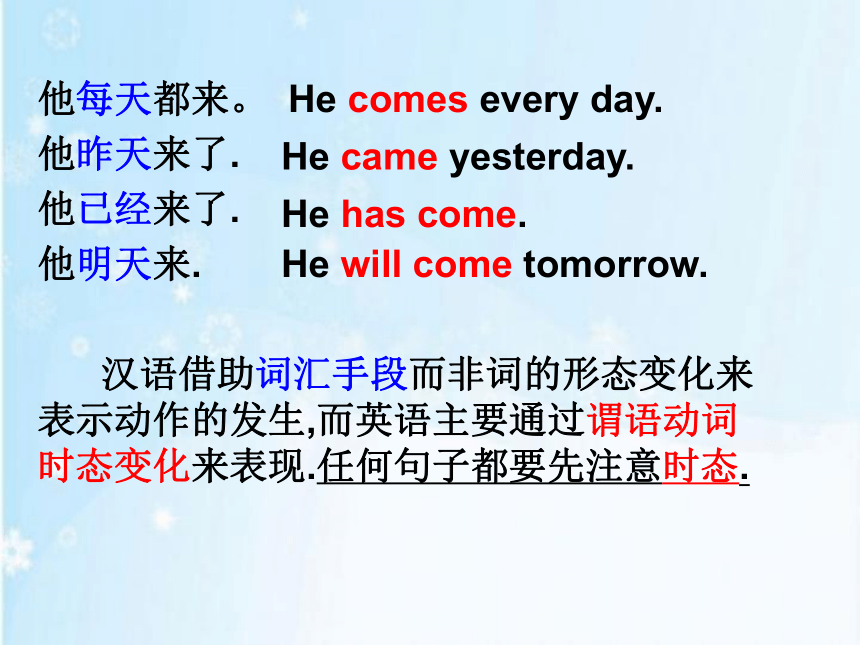
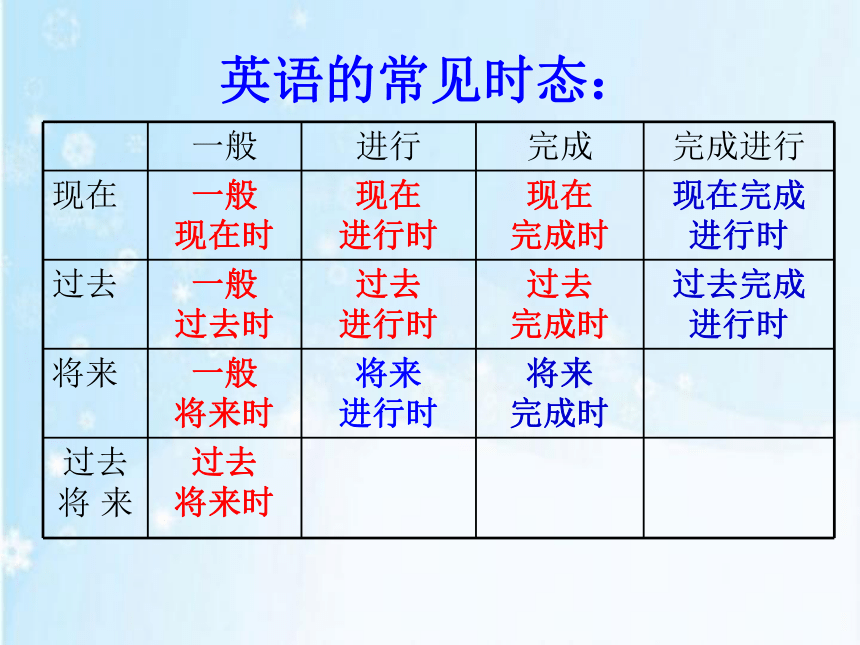
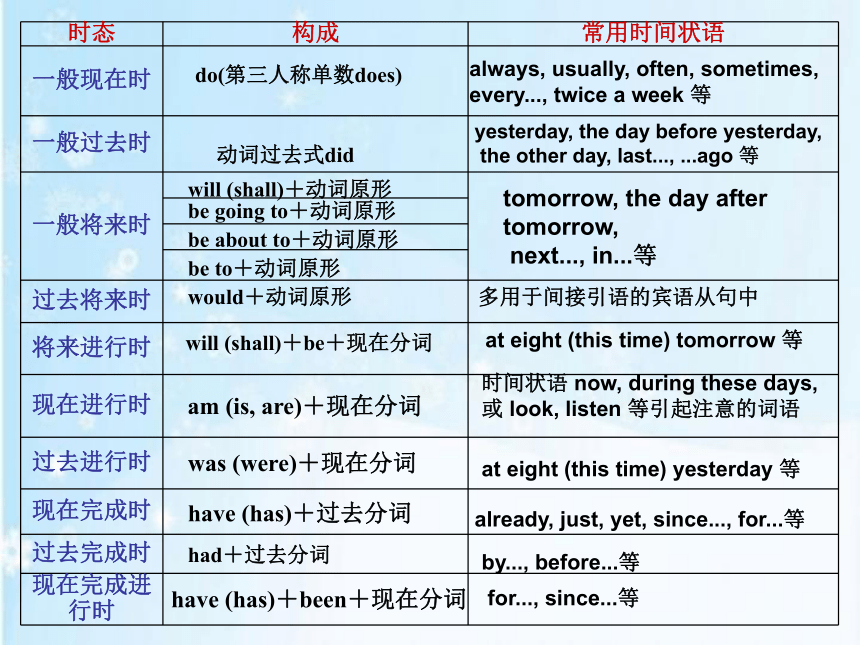

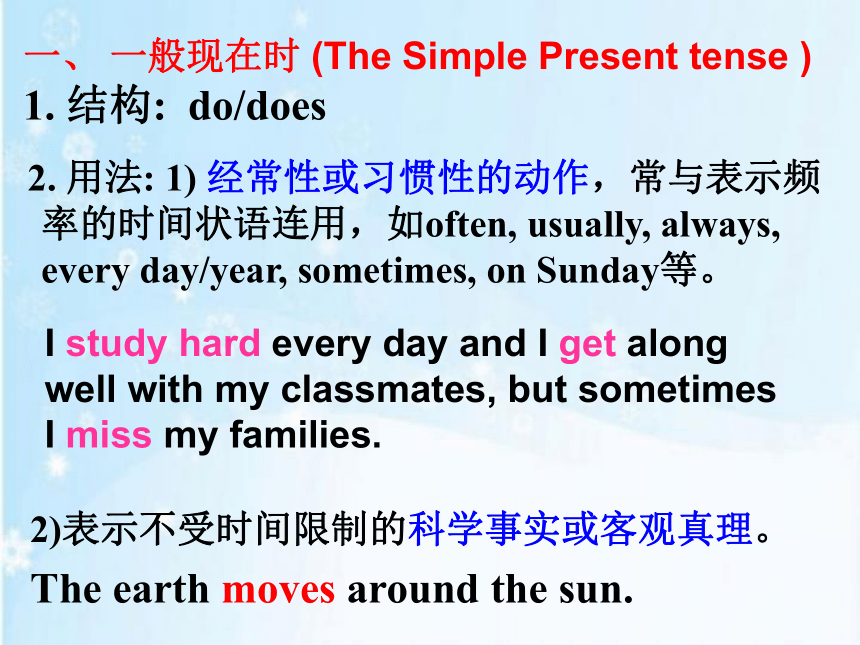
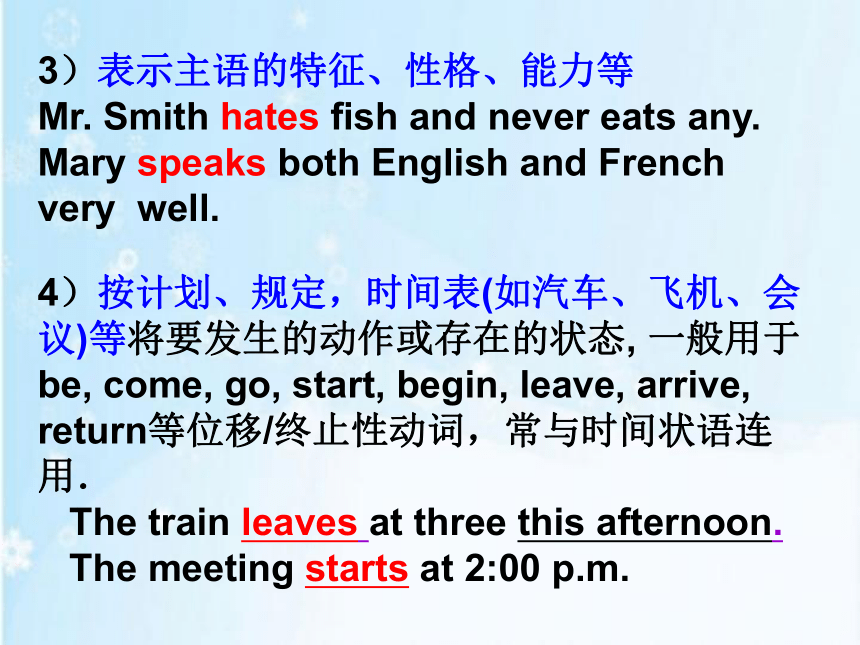
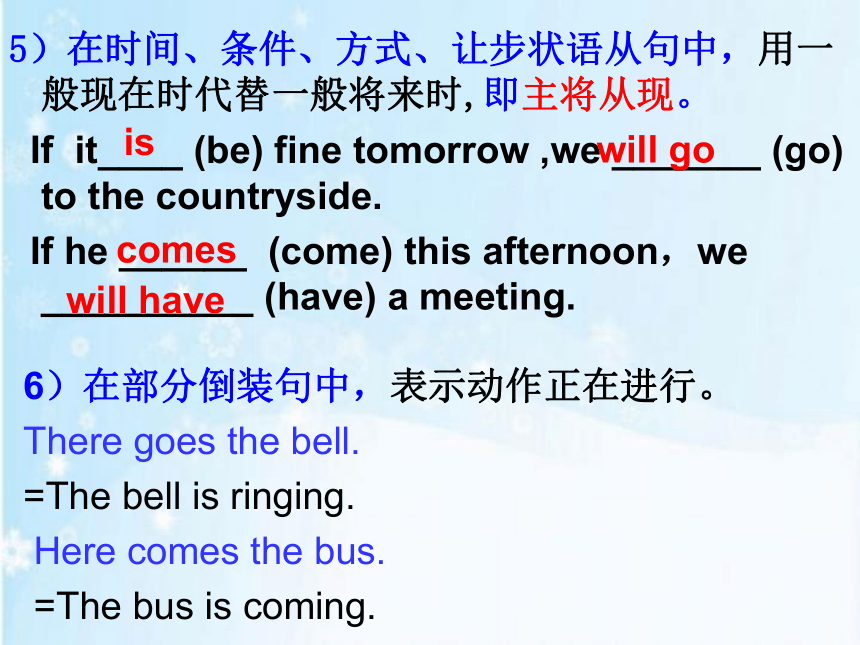
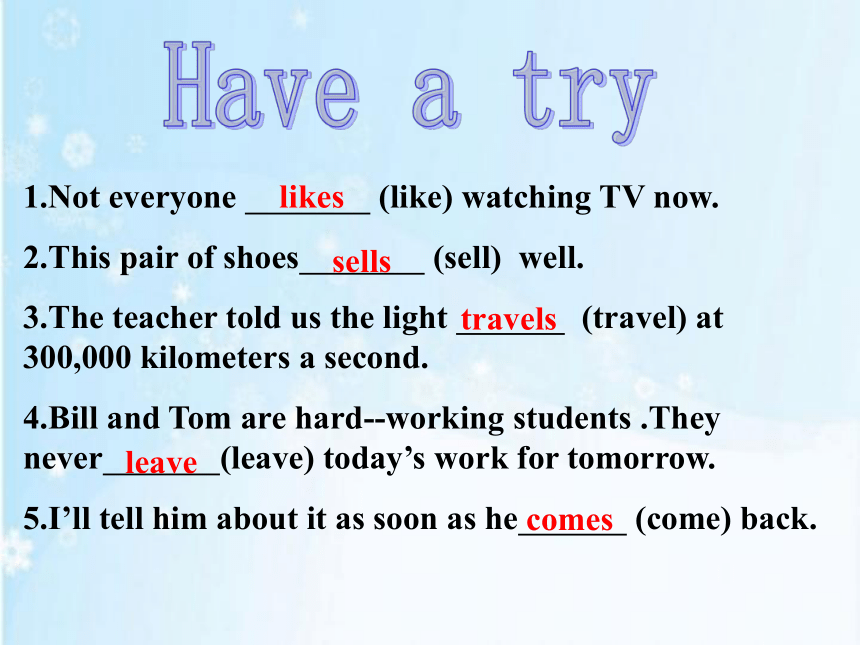
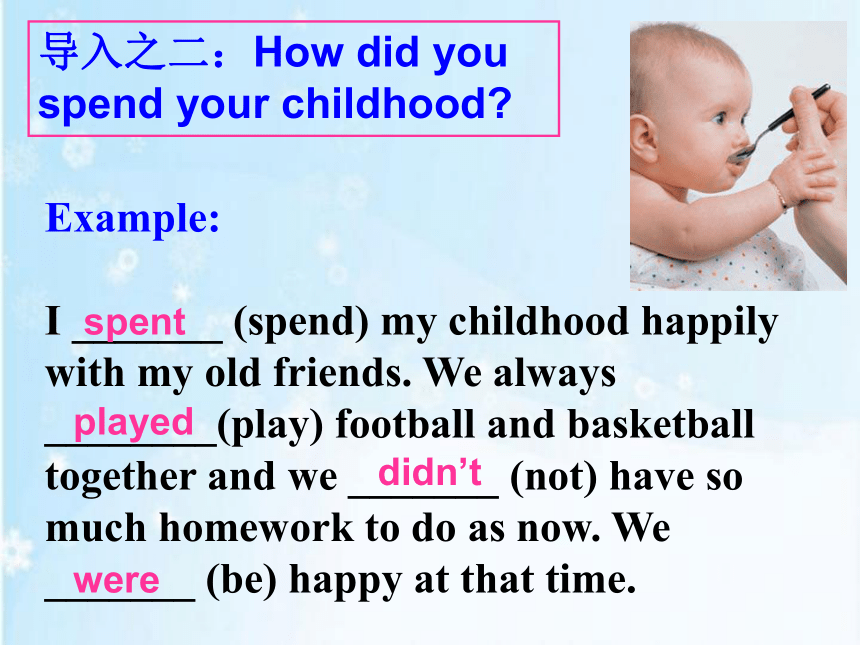
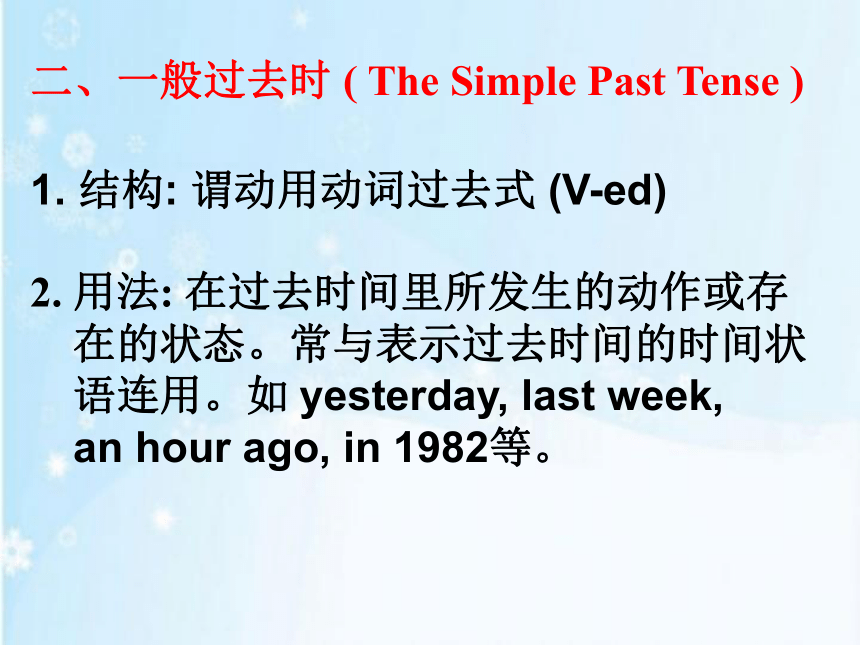

文档简介
课件55张PPT。English Basic Tenses (时态)他每天都来。
他昨天来了.
他已经来了.
他明天来.
汉语借助词汇手段而非词的形态变化来表示动作的发生,而英语主要通过谓语动词时态变化来表现.任何句子都要先注意时态.
He came yesterday.He has come.He will come tomorrow.He comes every day.英语的常见时态:do(第三人称单数does)动词过去式didwill (shall)+动词原形be going to+动词原形be about to+动词原形be to+动词原形would+动词原形will (shall)+be+现在分词
am (is, are)+现在分词was (were)+现在分词have (has)+过去分词had+过去分词 have (has)+been+现在分词always, usually, often, sometimes, every..., twice a week 等yesterday, the day before yesterday,
the other day, last..., ...ago 等tomorrow, the day after tomorrow,
next..., in...等 at eight (this time) tomorrow 等时间状语 now, during these days,或 look, listen 等引起注意的词语at eight (this time) yesterday 等already, just, yet, since..., for...等by..., before...等 for..., since...等 多用于间接引语的宾语从句中导入之一:How is your daily life as a high school student?( using 3 sentences or more,使用实意动词
和系动词, 注意动词形式变化) 2. 用法: 1) 经常性或习惯性的动作,常与表示频率的时间状语连用,如often, usually, always, every day/year, sometimes, on Sunday等。2)表示不受时间限制的科学事实或客观真理。
The earth moves around the sun.
I study hard every day and I get along well with my classmates, but sometimes I miss my families.一、 一般现在时 (The Simple Present tense )
1. 结构: do/does
3)表示主语的特征、性格、能力等
Mr. Smith hates fish and never eats any.
Mary speaks both English and French very well.4)按计划、规定,时间表(如汽车、飞机、会议)等将要发生的动作或存在的状态, 一般用于be, come, go, start, begin, leave, arrive, return等位移/终止性动词,常与时间状语连用.
The train leaves at three this afternoon.
The meeting starts at 2:00 p.m.6)在部分倒装句中,表示动作正在进行。
There goes the bell.
=The bell is ringing.
Here comes the bus.
=The bus is coming.5)在时间、条件、方式、让步状语从句中,用一般现在时代替一般将来时,即主将从现。
If it____ (be) fine tomorrow ,we _______ (go) to the countryside.
If he ______ (come) this afternoon,we __________ (have) a meeting.
iswill gocomeswill have1.Not everyone (like) watching TV now.
2.This pair of shoes (sell) well.
3.The teacher told us the light (travel) at 300,000 kilometers a second.
4.Bill and Tom are hard--working students .They never (leave) today’s work for tomorrow.
5.I’ll tell him about it as soon as he (come) back.Have a trylikessellstravelsleavecomesExample:
I _______ (spend) my childhood happily with my old friends. We always ________(play) football and basketball together and we _______ (not) have so much homework to do as now. We _______ (be) happy at that time.
spentplayed didn’twere导入之二:How did you spend your childhood?二、一般过去时 ( The Simple Past Tense )
1. 结构: 谓动用动词过去式 (V-ed)
2. 用法: 在过去时间里所发生的动作或存在的状态。常与表示过去时间的时间状语连用。如 yesterday, last week, an hour ago, in 1982等。
1.----Look! Someone has spilt (溢出)coffee on the carpet(地毯).
----Well , it _____ me.
A. isn’t B. wasn’t
C. hasn’t been D. hadn’t been
2.He (pretend) that a tiger toy was real and giving it a voice.B pretended 1)表示过去发生的,和现在没有联系的动作或状态2) 用一般过去时表示过去经常发生的动作
(也可用 “used to do”或 “would do” 代替)。
During the vacation she often swam / would swim / used to swim in the sea.
I used to smoke.
注意:①used to 表示过去常发生而现在不再发生的动作或存在的状态。
②would 注重过去习惯性发生的动作。1.At the end of the meeting, the headmaster (give) us a talk.
2.Listen! The radio says a serious accident _________ (happen) last night.
3.----Have you taken the medicine yet?
---- Yes, I (take) just now.
4.The rooms of library are clean. The boys __________ (sweep) them yesterday.
5.I was going home when I (meet) an old friend. gavehappenedtooksweptmetHave a try犹如picture导入之三:How will you spend your National holiday?
I will…
I’m going to…
三. 一般/过去将来时表示将来时的四种形式
① will / shall + 动词原形
② be going to do
③ be about to do
④ be to do 1. be going to 有很强的计划性,打算干什么,而will表示谈话时临时决定的意图,具有临时性和偶然性。
① ----The telephone is ringing.
----I _____ answer it.
will B. am going to C. am to D. am about to
② ---Alice, why didn’t you come yesterday?
---I _____, but I had an unexpected visitor.
A. had B. would C. was going to D. did
2. be going to 可用来表达某种迹象要发生的事。 而will 不能表示
Look at the clouds! It __________ rain.is going to√√3. be to 表示因约定、计划,职责、义务要求即将发生的动作, 或客观安排或受人指示而做某事。
be going to 表示主观的打算或计划。
I am to play football tomorrow afternoon.
I'm going to play football tomorrow afternoon.
4.be about to do 表示“正要干什么…”,
1)表示即将发生的动作,不与表示将来的时间状语连用。
2)常与when 连用,when 此时意思: 就在这时,是并列连词.
3)构成句型: ①… be about to do …when….
②…was / were doing… when…
③be on the point of doing…when…
④had just done sth…when…
e.g. I was about to leave when it rained.
导入之五:What are they doing now?
They are having a class.五. 现在/过去进行时 1.表示(现在/过去)说话时正在进行而尚未完成的动作或状态
① I don’t really work here. I’m helping until the new secretary comes.
② Selecting a mobile phone for personal use is no easy task because technology___ so rapidly.
A. will have changed B. has changed
C. is changing D. will changebe (am, are, is)+ doing√2. 表示(过去)目前这段时间内正在进行的动作,但说话时动作未必正在进行。She ___________ (learn) piano under Mr. Smith
at present.
is learning3.与always,constantly(不断地;时常地), usually, frequently, all the time等连用,表示赞成或厌恶的感彩。如: He is always helping others.
He was always thinking of others,never
thinking of himself.3. 现在进行时用来表示按计划即将发生的
动作,多用于位移/终止性动词,如: come, go, arrive, leave, stay, fly, take off.
I____________ (leave) tomorrow.
_____ you _______ (stay) here till next week?
am leavingArestaying
4.“系动词+介词或副词”, 也表示进行时的意义。
The bridge is/was under construction.
= is/was being constructed.
The problem is under discussion.
= is being discussed(1)表心理状态、情感的动词:like, love, hate, care, remember, believe, want, mind, wish, agree, mean, need。
(2) 表存在的状态动词:have, appear, exist, lie, remain, seem, belong to, depend on。
(3) 瞬间动词:begin/start, allow, accept, permit, promise, admit, complete。
(4)感官动词:see, hear, notice, feel摸起来/感觉起来, smell, sound, taste, look看起来。【注意】 一般情况下,下面4类动词无进行时态: 七. 现在完成时(The present Perfect Tense) 1. 结构: have (has) + done
2.用法:
1). 现在完成时表示过去某一时间开始,一直延
续到现在的动作或状态, 通常用于延续性动词. 常与表示延续性的时间状语连用, 如: so far, up to now, recently, since, for , over time等. I have lived in Zhuhai for 3 years.He has lived here since last summer.时间线现在过去lived延续到现在:has lived last summer since…2).表示过去的某一完成或者发生的动作对现在造成的影响
或结果,常用的时间状语有: just ,already, yet,
ever, never, once,twice,many times等.
We ____________ (finish) our lunch already.
______ you ever ______ (try) this method?
have finishedHavetried1.---Where are the twins?
---I think they (go) to Dafeng.
2.There (be)many changes in Caoyan in the past 5 years.
3.Jim (visit) the park twice since last month.
4.So far, We (learn) about 6 hundred English words.
5.She (not give) the CDs back to me yet.have gonehave beenhas visitedhave learnthasn’t givenHave a trysince和for 填空since +______ , 用来说明动作起始时间
for+_______ , 用来说明动作延续时间。
I have lived here ____ at least twenty years. I have lived here ____ I was born. 时间点时间段forsince 固定的特殊句型:
1. It is (has been) +一段时间 +since-clause.
2. This (That/It) is the first (second…) time + that-clause (现在完成时).
3. This (That/It) is the best/ finest /most interesting … + that-clause (现在完成时).
Tips:比较一般过去时与现在完成时 1). 一般过去时只表示发生在过去的动作或存在的状态, 不涉及对现在的影响;现在完成时表示发生在过去的动作或状态一直延续到现在, 或强调过去的事情对现在的造成的影响。
My family lived in Zhuhai 10 years ago.
(现在不在珠海了)
My family have lived in Zhuhai for 10 years.
(目前还在珠海)
2). 过去时常与具体的表示过去的时间状语连用,而现在完成时通常与不确定的或包括现在在内的时间状语连用,或无时间状语.
I ______ (study) in Zhongshan university in 2000.
I ___________ (study) in Zhongshan university since 2000.
I _____ just _______ (buy) an apartment. (just表示不确定的时间状语)studiedhave studiedhavebought注意:非延续性动词不能与表示延续时间的状语(since…;for…)连用。但其否定形式则可以。 1)They have married for ten years.
2) I have received his letter a month ago. 3) I haven't received his letter for a month. FFThave been marriedThey got married ten years ago. 我已收到他的信一个月了。
I have received his letter for a month. ( )
请改用三个正确的表达法:
1._____________________________________
2._____________________________________
3._____________________________________
×I have kept his letter for a month.It is a month since I received his letter.I received his letter a month ago.八.过去完成时?(The past perfect Tense)结构: had + done
概念:表示过去的过去 ----|--------------|---------|---->
过去的过去 过去 现在 将来
By the end of last term we had learnt 20 units.
现在过去过去的过去the end of
last termhad learnt时间线用法
1. 表示过去某一时刻或某一动作之前完成的动作或状态。句中常用by the end, by the time, by,before,until,when等词引导的时间状语。如:
I had hoped to see more of ShangHai.
I had meant to help you, but I was too busy at the moment.
I had thought you would come tomorrow.
2. 表示未曾实现的愿望、打算、意图、承诺等。意为 “本来打算”, “本来想”。常用had hoped / planned / meant / intended / thought / wanted / expected(+that…/to do)或用上述动词的过去式接不定式完成式表示,即:hoped / planned… + to (have done)。
3、常用于下列句型中:
1) Hardly /No sooner…(过去完成时)when /than…(一般过去时)。
2) It /This /That was the time that…(从句用过去完成时)。
3) It was +一段时间+since(从句用过去完成时)。
We had no sooner been seated than the bus started.
= Hardly/Scarcely _____ we been seated when the bus started.
had1.When the police arrived, the thieves _________________(run away).
2.When I came into the classroom, my dear students ______________ (begin) reading.
3. He walked in as if he ____________ (buy) the school .
had run awayhad begunhad bought Have a try4. I _____ to take a good holiday this year, but I wasn’t able to get away. ?
A. hope B. have hoped
C. had hoped D. hoped ?
5. Helen _____ her key in the office so she had to wait until her husband _____ home.
A. has left; comes B. left; had come
C. had left; came D. had left; would come ?
cc导入之九: ---How long have you been studying in this school? ---Almost two and a half years.九、现在完成进行时 主语 + has / have + been +doing….
表示过去某一时间发生一直持续到现在还会继续下去的动作(动作未完成),动词必须用延续性动词。
He has been working here for three years.
The number of foreign students attending Chinese universities has been rising steadily since 1990.
--- Isn’t it hard to drive downtown to work?
--- Yes, that’ why I ____to work by train.
A. have been going B. have gone
C. was going D. will have gone
√现在完成时与现在完成进行时的区别
1. 现在完成时:表到现在为止已经完成,或过去发生的动作对现在的影响或产生的结果,也可表示延续性;
现在完成进行时: 往往强调仍将继续下去的动作。
I have written a letter. (已完成)
I have been writing a letter.(未完成)过去现在时间线have writtenhave been writing2.有些延续性动词,如live, teach, work, study, learn, stay等因现在完成时与现在完成进行时差别不大。
I have lived here for ten years.
= I have been living here for ten years.
解动词填空题“三步曲”一看时间状语
1.There (be) a match this evening.
2. Mother never knew what ___________ (happen) in 10 years.
3.I (have) this book for 2 weeks.
4.Alice (wait) for us in the room now.
5.Every year, many trees (plant) along the river. will bewould happenhave hadis waitingare planted二观上下文联系
1.She can’t be here. She (go) to Canada.
2.Keep quiet, please! They (have) a lesson.
3.---Hi,Lin Tao. I didn’t see you at the party.
---Oh, I (get) ready for the exam.
4.Don’t come here tomorrow. I (have) a meeting. has goneare havingwas gettingwill have三找隐含条件
1.Tom (go) to bed early but his brother doesn’t.
2.---What did the teacher say just now?
---He said that the earth (travel) around the sun.
3.The bridge (be) open to traffic in a few years, isn’t it?
4.Listen! Jim’s radio (make) a loud
noise. Would you please tell him _________ (turn) it down? goestravelsis going to beis makingto turnExercises
I usually ____ up at 6:00, but yesterday I ______ up at 7:00 and tomorrow I _________ up at 6:30. (get)
Listen! Someone ____________ (knock) at the door.
I ___________ (be) in Beijing for two years.
How often _____ Andy _______ (surf) the internet?
He fell asleep while he ___________ (read) a book.
getwill getgotis knocking have been doessurfwas reading6. I ________ never _______ (hear) of that man before.
7. My brother often _________ (go) for walks last summer.
8. Lily said she __________ (put) on the new dress the next day.
9. ______ the story ________ (happen) in London in 1949?
10. What ______ his mother ______ (do) when he opened the door?
haveheardwentwould putDid happenwasdoing11. If it ______________ (not rain) tomorrow, they ___________ (go) fishing.
12. ______ your mother ________ the piano every Sunday?
13. They _______ (not) call you the day after tomorrow.
14. Tom _____________ (work) there since two years ago.
15. By the time I _________ (walk) into the classroom, the teacher ___________ (start) teaching.
doesn’t rainwill go Does has workedwon’t walkedhad startedplay Jenny
Jenny _____ (be) a foreign girl. She _______ (come) from the United States. Look, she _____________ (draw) pictures in the living room.
Two years ago, her parents _________ (move) to China. Jenny ____________ (not have) any friends, so she _______ (feel) lonely. But now, she _______ (have) many Chinese friends and _______ (study) with them everyday. Jenny ___________ (visit) her grandparents in the United States next month.iscomesis drawingmoveddidn’t havefelthasstudieswill visitOne good turn deserves another
I _____________ (have) dinner at a restaurant when Tony Steele came in. Tony _______ (work) in a lawyer's office years ago, but he ____________ (work) at a bank now. He ______ (get) a good salary, but he always _______ (borrow) money from his friends and never ______ (pay) it back. Tony _____ (see) me and _____ (come) and ____ (sit) at the same table. He ___ never ____________ (borrow) money from me. While he ______________ (eat), I _____ (ask) him to lend me twenty pounds. To my surprise, he _____ (give) me the money immediately. 'I have never borrowed any money from you,' Tony said, 'so now you can pay for my dinner!' was havingworkedis workingaskedsawcamehassatgavewas eatingborrowsgetspaysborrowed
他昨天来了.
他已经来了.
他明天来.
汉语借助词汇手段而非词的形态变化来表示动作的发生,而英语主要通过谓语动词时态变化来表现.任何句子都要先注意时态.
He came yesterday.He has come.He will come tomorrow.He comes every day.英语的常见时态:do(第三人称单数does)动词过去式didwill (shall)+动词原形be going to+动词原形be about to+动词原形be to+动词原形would+动词原形will (shall)+be+现在分词
am (is, are)+现在分词was (were)+现在分词have (has)+过去分词had+过去分词 have (has)+been+现在分词always, usually, often, sometimes, every..., twice a week 等yesterday, the day before yesterday,
the other day, last..., ...ago 等tomorrow, the day after tomorrow,
next..., in...等 at eight (this time) tomorrow 等时间状语 now, during these days,或 look, listen 等引起注意的词语at eight (this time) yesterday 等already, just, yet, since..., for...等by..., before...等 for..., since...等 多用于间接引语的宾语从句中导入之一:How is your daily life as a high school student?( using 3 sentences or more,使用实意动词
和系动词, 注意动词形式变化) 2. 用法: 1) 经常性或习惯性的动作,常与表示频率的时间状语连用,如often, usually, always, every day/year, sometimes, on Sunday等。2)表示不受时间限制的科学事实或客观真理。
The earth moves around the sun.
I study hard every day and I get along well with my classmates, but sometimes I miss my families.一、 一般现在时 (The Simple Present tense )
1. 结构: do/does
3)表示主语的特征、性格、能力等
Mr. Smith hates fish and never eats any.
Mary speaks both English and French very well.4)按计划、规定,时间表(如汽车、飞机、会议)等将要发生的动作或存在的状态, 一般用于be, come, go, start, begin, leave, arrive, return等位移/终止性动词,常与时间状语连用.
The train leaves at three this afternoon.
The meeting starts at 2:00 p.m.6)在部分倒装句中,表示动作正在进行。
There goes the bell.
=The bell is ringing.
Here comes the bus.
=The bus is coming.5)在时间、条件、方式、让步状语从句中,用一般现在时代替一般将来时,即主将从现。
If it____ (be) fine tomorrow ,we _______ (go) to the countryside.
If he ______ (come) this afternoon,we __________ (have) a meeting.
iswill gocomeswill have1.Not everyone (like) watching TV now.
2.This pair of shoes (sell) well.
3.The teacher told us the light (travel) at 300,000 kilometers a second.
4.Bill and Tom are hard--working students .They never (leave) today’s work for tomorrow.
5.I’ll tell him about it as soon as he (come) back.Have a trylikessellstravelsleavecomesExample:
I _______ (spend) my childhood happily with my old friends. We always ________(play) football and basketball together and we _______ (not) have so much homework to do as now. We _______ (be) happy at that time.
spentplayed didn’twere导入之二:How did you spend your childhood?二、一般过去时 ( The Simple Past Tense )
1. 结构: 谓动用动词过去式 (V-ed)
2. 用法: 在过去时间里所发生的动作或存在的状态。常与表示过去时间的时间状语连用。如 yesterday, last week, an hour ago, in 1982等。
1.----Look! Someone has spilt (溢出)coffee on the carpet(地毯).
----Well , it _____ me.
A. isn’t B. wasn’t
C. hasn’t been D. hadn’t been
2.He (pretend) that a tiger toy was real and giving it a voice.B pretended 1)表示过去发生的,和现在没有联系的动作或状态2) 用一般过去时表示过去经常发生的动作
(也可用 “used to do”或 “would do” 代替)。
During the vacation she often swam / would swim / used to swim in the sea.
I used to smoke.
注意:①used to 表示过去常发生而现在不再发生的动作或存在的状态。
②would 注重过去习惯性发生的动作。1.At the end of the meeting, the headmaster (give) us a talk.
2.Listen! The radio says a serious accident _________ (happen) last night.
3.----Have you taken the medicine yet?
---- Yes, I (take) just now.
4.The rooms of library are clean. The boys __________ (sweep) them yesterday.
5.I was going home when I (meet) an old friend. gavehappenedtooksweptmetHave a try犹如picture导入之三:How will you spend your National holiday?
I will…
I’m going to…
三. 一般/过去将来时表示将来时的四种形式
① will / shall + 动词原形
② be going to do
③ be about to do
④ be to do 1. be going to 有很强的计划性,打算干什么,而will表示谈话时临时决定的意图,具有临时性和偶然性。
① ----The telephone is ringing.
----I _____ answer it.
will B. am going to C. am to D. am about to
② ---Alice, why didn’t you come yesterday?
---I _____, but I had an unexpected visitor.
A. had B. would C. was going to D. did
2. be going to 可用来表达某种迹象要发生的事。 而will 不能表示
Look at the clouds! It __________ rain.is going to√√3. be to 表示因约定、计划,职责、义务要求即将发生的动作, 或客观安排或受人指示而做某事。
be going to 表示主观的打算或计划。
I am to play football tomorrow afternoon.
I'm going to play football tomorrow afternoon.
4.be about to do 表示“正要干什么…”,
1)表示即将发生的动作,不与表示将来的时间状语连用。
2)常与when 连用,when 此时意思: 就在这时,是并列连词.
3)构成句型: ①… be about to do …when….
②…was / were doing… when…
③be on the point of doing…when…
④had just done sth…when…
e.g. I was about to leave when it rained.
导入之五:What are they doing now?
They are having a class.五. 现在/过去进行时 1.表示(现在/过去)说话时正在进行而尚未完成的动作或状态
① I don’t really work here. I’m helping until the new secretary comes.
② Selecting a mobile phone for personal use is no easy task because technology___ so rapidly.
A. will have changed B. has changed
C. is changing D. will changebe (am, are, is)+ doing√2. 表示(过去)目前这段时间内正在进行的动作,但说话时动作未必正在进行。She ___________ (learn) piano under Mr. Smith
at present.
is learning3.与always,constantly(不断地;时常地), usually, frequently, all the time等连用,表示赞成或厌恶的感彩。如: He is always helping others.
He was always thinking of others,never
thinking of himself.3. 现在进行时用来表示按计划即将发生的
动作,多用于位移/终止性动词,如: come, go, arrive, leave, stay, fly, take off.
I____________ (leave) tomorrow.
_____ you _______ (stay) here till next week?
am leavingArestaying
4.“系动词+介词或副词”, 也表示进行时的意义。
The bridge is/was under construction.
= is/was being constructed.
The problem is under discussion.
= is being discussed(1)表心理状态、情感的动词:like, love, hate, care, remember, believe, want, mind, wish, agree, mean, need。
(2) 表存在的状态动词:have, appear, exist, lie, remain, seem, belong to, depend on。
(3) 瞬间动词:begin/start, allow, accept, permit, promise, admit, complete。
(4)感官动词:see, hear, notice, feel摸起来/感觉起来, smell, sound, taste, look看起来。【注意】 一般情况下,下面4类动词无进行时态: 七. 现在完成时(The present Perfect Tense) 1. 结构: have (has) + done
2.用法:
1). 现在完成时表示过去某一时间开始,一直延
续到现在的动作或状态, 通常用于延续性动词. 常与表示延续性的时间状语连用, 如: so far, up to now, recently, since, for , over time等. I have lived in Zhuhai for 3 years.He has lived here since last summer.时间线现在过去lived延续到现在:has lived last summer since…2).表示过去的某一完成或者发生的动作对现在造成的影响
或结果,常用的时间状语有: just ,already, yet,
ever, never, once,twice,many times等.
We ____________ (finish) our lunch already.
______ you ever ______ (try) this method?
have finishedHavetried1.---Where are the twins?
---I think they (go) to Dafeng.
2.There (be)many changes in Caoyan in the past 5 years.
3.Jim (visit) the park twice since last month.
4.So far, We (learn) about 6 hundred English words.
5.She (not give) the CDs back to me yet.have gonehave beenhas visitedhave learnthasn’t givenHave a trysince和for 填空since +______ , 用来说明动作起始时间
for+_______ , 用来说明动作延续时间。
I have lived here ____ at least twenty years. I have lived here ____ I was born. 时间点时间段forsince 固定的特殊句型:
1. It is (has been) +一段时间 +since-clause.
2. This (That/It) is the first (second…) time + that-clause (现在完成时).
3. This (That/It) is the best/ finest /most interesting … + that-clause (现在完成时).
Tips:比较一般过去时与现在完成时 1). 一般过去时只表示发生在过去的动作或存在的状态, 不涉及对现在的影响;现在完成时表示发生在过去的动作或状态一直延续到现在, 或强调过去的事情对现在的造成的影响。
My family lived in Zhuhai 10 years ago.
(现在不在珠海了)
My family have lived in Zhuhai for 10 years.
(目前还在珠海)
2). 过去时常与具体的表示过去的时间状语连用,而现在完成时通常与不确定的或包括现在在内的时间状语连用,或无时间状语.
I ______ (study) in Zhongshan university in 2000.
I ___________ (study) in Zhongshan university since 2000.
I _____ just _______ (buy) an apartment. (just表示不确定的时间状语)studiedhave studiedhavebought注意:非延续性动词不能与表示延续时间的状语(since…;for…)连用。但其否定形式则可以。 1)They have married for ten years.
2) I have received his letter a month ago. 3) I haven't received his letter for a month. FFThave been marriedThey got married ten years ago. 我已收到他的信一个月了。
I have received his letter for a month. ( )
请改用三个正确的表达法:
1._____________________________________
2._____________________________________
3._____________________________________
×I have kept his letter for a month.It is a month since I received his letter.I received his letter a month ago.八.过去完成时?(The past perfect Tense)结构: had + done
概念:表示过去的过去 ----|--------------|---------|---->
过去的过去 过去 现在 将来
By the end of last term we had learnt 20 units.
现在过去过去的过去the end of
last termhad learnt时间线用法
1. 表示过去某一时刻或某一动作之前完成的动作或状态。句中常用by the end, by the time, by,before,until,when等词引导的时间状语。如:
I had hoped to see more of ShangHai.
I had meant to help you, but I was too busy at the moment.
I had thought you would come tomorrow.
2. 表示未曾实现的愿望、打算、意图、承诺等。意为 “本来打算”, “本来想”。常用had hoped / planned / meant / intended / thought / wanted / expected(+that…/to do)或用上述动词的过去式接不定式完成式表示,即:hoped / planned… + to (have done)。
3、常用于下列句型中:
1) Hardly /No sooner…(过去完成时)when /than…(一般过去时)。
2) It /This /That was the time that…(从句用过去完成时)。
3) It was +一段时间+since(从句用过去完成时)。
We had no sooner been seated than the bus started.
= Hardly/Scarcely _____ we been seated when the bus started.
had1.When the police arrived, the thieves _________________(run away).
2.When I came into the classroom, my dear students ______________ (begin) reading.
3. He walked in as if he ____________ (buy) the school .
had run awayhad begunhad bought Have a try4. I _____ to take a good holiday this year, but I wasn’t able to get away. ?
A. hope B. have hoped
C. had hoped D. hoped ?
5. Helen _____ her key in the office so she had to wait until her husband _____ home.
A. has left; comes B. left; had come
C. had left; came D. had left; would come ?
cc导入之九: ---How long have you been studying in this school? ---Almost two and a half years.九、现在完成进行时 主语 + has / have + been +doing….
表示过去某一时间发生一直持续到现在还会继续下去的动作(动作未完成),动词必须用延续性动词。
He has been working here for three years.
The number of foreign students attending Chinese universities has been rising steadily since 1990.
--- Isn’t it hard to drive downtown to work?
--- Yes, that’ why I ____to work by train.
A. have been going B. have gone
C. was going D. will have gone
√现在完成时与现在完成进行时的区别
1. 现在完成时:表到现在为止已经完成,或过去发生的动作对现在的影响或产生的结果,也可表示延续性;
现在完成进行时: 往往强调仍将继续下去的动作。
I have written a letter. (已完成)
I have been writing a letter.(未完成)过去现在时间线have writtenhave been writing2.有些延续性动词,如live, teach, work, study, learn, stay等因现在完成时与现在完成进行时差别不大。
I have lived here for ten years.
= I have been living here for ten years.
解动词填空题“三步曲”一看时间状语
1.There (be) a match this evening.
2. Mother never knew what ___________ (happen) in 10 years.
3.I (have) this book for 2 weeks.
4.Alice (wait) for us in the room now.
5.Every year, many trees (plant) along the river. will bewould happenhave hadis waitingare planted二观上下文联系
1.She can’t be here. She (go) to Canada.
2.Keep quiet, please! They (have) a lesson.
3.---Hi,Lin Tao. I didn’t see you at the party.
---Oh, I (get) ready for the exam.
4.Don’t come here tomorrow. I (have) a meeting. has goneare havingwas gettingwill have三找隐含条件
1.Tom (go) to bed early but his brother doesn’t.
2.---What did the teacher say just now?
---He said that the earth (travel) around the sun.
3.The bridge (be) open to traffic in a few years, isn’t it?
4.Listen! Jim’s radio (make) a loud
noise. Would you please tell him _________ (turn) it down? goestravelsis going to beis makingto turnExercises
I usually ____ up at 6:00, but yesterday I ______ up at 7:00 and tomorrow I _________ up at 6:30. (get)
Listen! Someone ____________ (knock) at the door.
I ___________ (be) in Beijing for two years.
How often _____ Andy _______ (surf) the internet?
He fell asleep while he ___________ (read) a book.
getwill getgotis knocking have been doessurfwas reading6. I ________ never _______ (hear) of that man before.
7. My brother often _________ (go) for walks last summer.
8. Lily said she __________ (put) on the new dress the next day.
9. ______ the story ________ (happen) in London in 1949?
10. What ______ his mother ______ (do) when he opened the door?
haveheardwentwould putDid happenwasdoing11. If it ______________ (not rain) tomorrow, they ___________ (go) fishing.
12. ______ your mother ________ the piano every Sunday?
13. They _______ (not) call you the day after tomorrow.
14. Tom _____________ (work) there since two years ago.
15. By the time I _________ (walk) into the classroom, the teacher ___________ (start) teaching.
doesn’t rainwill go Does has workedwon’t walkedhad startedplay Jenny
Jenny _____ (be) a foreign girl. She _______ (come) from the United States. Look, she _____________ (draw) pictures in the living room.
Two years ago, her parents _________ (move) to China. Jenny ____________ (not have) any friends, so she _______ (feel) lonely. But now, she _______ (have) many Chinese friends and _______ (study) with them everyday. Jenny ___________ (visit) her grandparents in the United States next month.iscomesis drawingmoveddidn’t havefelthasstudieswill visitOne good turn deserves another
I _____________ (have) dinner at a restaurant when Tony Steele came in. Tony _______ (work) in a lawyer's office years ago, but he ____________ (work) at a bank now. He ______ (get) a good salary, but he always _______ (borrow) money from his friends and never ______ (pay) it back. Tony _____ (see) me and _____ (come) and ____ (sit) at the same table. He ___ never ____________ (borrow) money from me. While he ______________ (eat), I _____ (ask) him to lend me twenty pounds. To my surprise, he _____ (give) me the money immediately. 'I have never borrowed any money from you,' Tony said, 'so now you can pay for my dinner!' was havingworkedis workingaskedsawcamehassatgavewas eatingborrowsgetspaysborrowed
